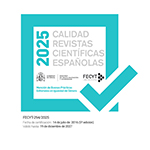Linguistische Probleme der Tempuskategorie Futur. Eine Untersuchung am Beispiel der deutschen und spanischen Gegenwartssprache
Abstract
The present paper deals with the future tense in modern German and its dubious efficiency to express chronological futurity, that is, future time and meaning. For this proposal I based my study upon Dietrichs theory of the relative modality (1992) and, breaking with all conventions of the grammatical tradition, I will try to prove that the future is not a tense but a modal category, more properly a semantic category capable of expressing conditional validity.Downloads
Article download
License
In order to support the global exchange of knowledge, the journal Revista de Filología Alemana is allowing unrestricted access to its content as from its publication in this electronic edition, and as such it is an open-access journal. The originals published in this journal are the property of the Complutense University of Madrid and any reproduction thereof in full or in part must cite the source. All content is distributed under a Creative Commons Attribution 4.0 use and distribution licence (CC BY 4.0). This circumstance must be expressly stated in these terms where necessary. You can view the summary and the complete legal text of the licence.










